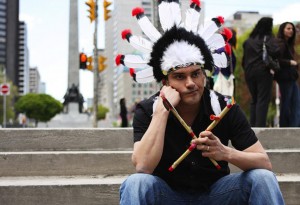BOOK REVIEW: PEACE PIPE DREAMS – THE TRUTH ABOUT LIES ABOUT INDIANS by Darrell Dennis
Reviewed by Lise Watson
Peace Pipe Dreams should be on every Canadian’s gift-giving list this year. At a time when we are still dawdling about with regard to all things aboriginal, from the missing and murdered women to the outrageous price of food in the North, it’s time we educated ourselves and faced reality. And Dennis makes this easy for us with this smart tome, which I have nicknamed “Aboriginal Canadians For Dummies”. From the very start, Dennis sets out to destroy every stereotype, and even those of us who feel we avoid wrapping these chestnuts around ourselves like a cloak will learn a thing or three.
He begins with a chapter which defines “Native Names”. Feeling confused about when to use Aboriginal, Native and First Nations, and wondering if “indian” is actually a four-letter word? Then this chapter is for you! Yes, it’s complex and tangled up in history and racism, but the best advice is to be as specific as you can be, depending on the circumstance, and leave the “i” word for you know who to reclaim at will, or not. Take note when someone introduces herself or himself, are they Anishinaabe or a Mississauga of the New Credit? Makes sense.
In the next two chapters, Dennis sets about describing the past and present perceptions Europeans and North Americans have had about aboriginals on this continent within their historical and religious contexts. He explains the various governmental proclamations and acts that were imposed over the years in an attempt to assimilate our first peoples into colonial society, the origins of derogatory terminology, as well as the appropriation of aboriginal symbols, regalia and culture. ( I had no idea Hitler was such a fan!)
The next chapter, “Natives & Alcohol”, is fascinating and informative. Who knew that Europeans are also missing the so-called “alcoholism protection genes”? The research shows that, in fact, alcohol consumption is lower amongst aboriginal people than non-aboriginal, while alcohol-related deaths are three times higher, and aboriginal drinking excesses, where they exist, tend toward binge drinking. This seems an obvious response to deplorable social conditions, but mainstream Canada is still skeptical. As Dennis says we are “…inundated with the stereotype that Natives drink in excess not because of a defective social system but rather because Native people have a defective character.” Next time you see an intoxicated aboriginal person in the streets, remember that alcoholism and homelessness often go hand in hand, and that wealthy alcoholics are sitting pretty in their homes and boardrooms, and sadly, driving their Porsches.
This is part of the brilliance of Dennis’ work. He effortlessly demonstrates that aboriginal people are just like “regular Canadians”, as he puts it. Yes, like regular Canadians who have rights to and actually get education, social services and the other basics of a meaningful life; regular Canadians who have strengths and flaws, and coping mechanisms. Why he needs to do this remains mystifying, until you finish the book.
We go on to the chapter on “Religion and Residential Schools”. ‘Nuff said? Well, maybe not since the mainstream media so often underestimates the negative impact of these horrific institutions and their attempts at “taking the Indian out of the Indian” on current and future generations. There is a terrific discussion on the aboriginal religion and spirituality towards the end of this chapter that is also well worth reading.
The next three chapters give a thorough overview of aboriginal treaties, land issues, the diversity amongst First Nations reserves, government, taxation and accountability and other contentious issues that dominate the media. Dennis does not excuse corruption and nepotism, rather he highlights the double standards and paternalism towards aboriginal people that persist to this day and the facts about aboriginal rights. Aboriginal populations are growing fast, so yes, we need to know and care.
Now, you may be thinking this will be a dry history lesson with a healthy dollup of propaganda, but nothing could be further from the truth. Remember that Dennis is a comedian, as well as an actor and playwright, and he makes full use of his high cheek bones, errrr…. funny bone, to tell the story of his people. This is easy reading with plenty of raw meat to chew on. Ahem.
And there is a happy ending. “Not since first contact have Native people been so active, so prepared and so ready to change perceptions in order to claim our past glory and the inevitable glory of our future.”
‘Peace Pipe Dreams: The Truth about Lies about Indians’ is published by Douglas and McIntyre and available at bookstores everywhere or amazon.com.
Darrell Dennis is a member of the Secwepemc (Shuswap) Nation located in the interior of British Columbia. He currently resides in Los Angeles, California.



